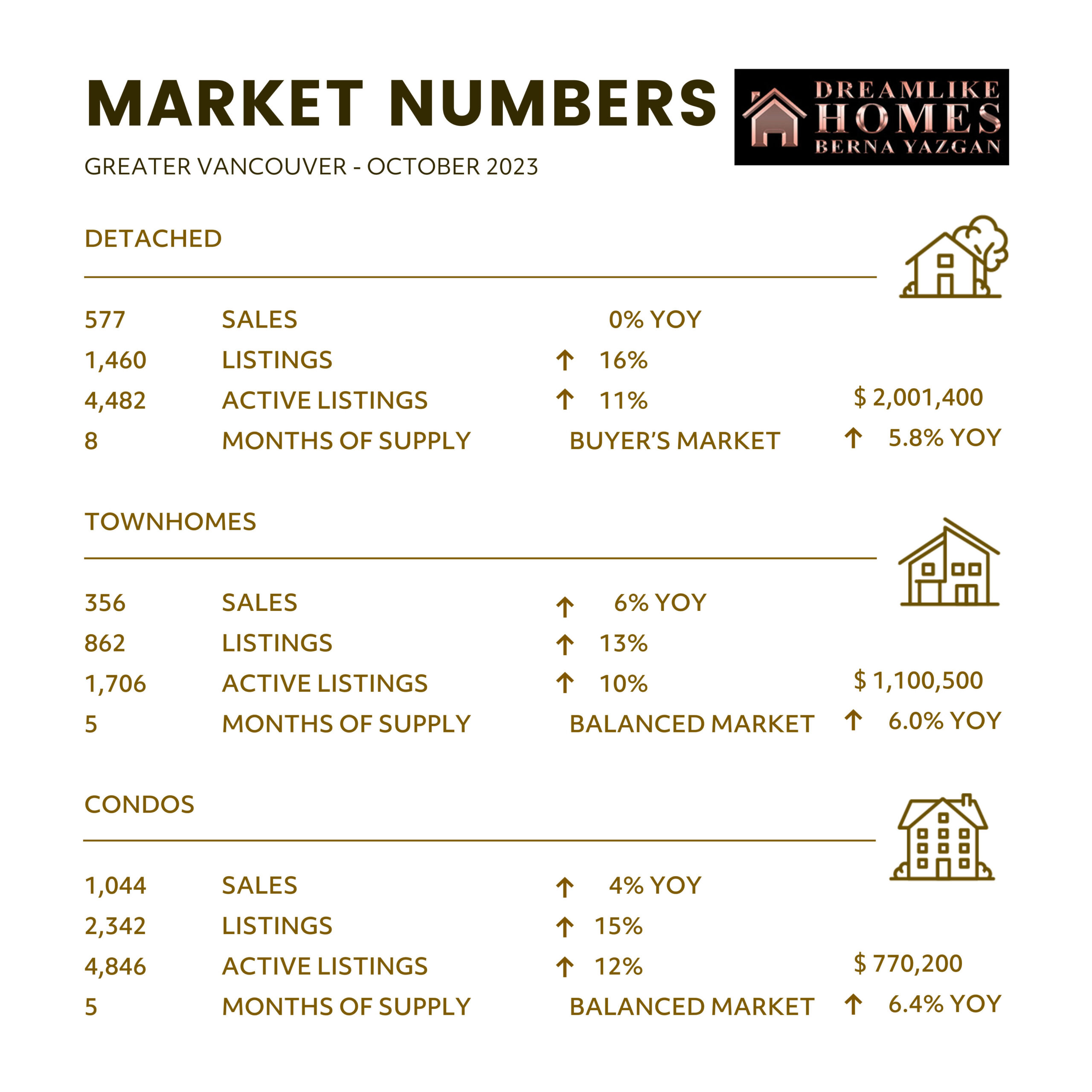Median prices reveal where deals are emerging
• Economists now predict interest rates will fall by 2.5%
• Median home prices are down this year in virtually every Metro market
• Priciest detached markets lead the sales curve in Metro Vancouver
• Province mandates 2-4 housing units on every detached house lot
• Buyer’s market conditions now dominate suburban housing markets
Sometimes you just wonder about the short memories of Metro Vancouver home buyers and sellers. How many times have people been moaning about a tick-up in mortgage rates, about a perceived lack of homes, about too many investors and the lack of affordability. About world events hurtling us to a recession.
Plenty, so it sounds as familiar today as it did in say 2000, or in the misty past of four weeks ago when headlines and pundits were all about a housing shortage, soaring interest rates and rising home prices.
Yet, if one looks at the Metro Vancouver market this October of 2023, it is the most welcoming environment in years for both buyers and sellers. But many appear blinded by the brilliance of what is in plain sight. Is it time for a reality check?
Housing shortage? The Canadian Press headline this week is “Housing supply outpacing demand in Vancouver market.” This is because there are now 11,599 homes for sale in Greater Vancouver, up 12.6% from a year ago and above the 10-year average. The Fraser Valley has another 6,580 active listings, 17% higher than in October 2022. That is a total of more than 18,000 residential properties for sale, yet total October sales in the entire region were less than 3,000. Message: there is a terrific selection of homes for sale right across the Lower Mainland.
Soaring interest rates? The Bank of Canada did not increase interest rates at the October setting and now there is growing belief that rates will be coming down, perhaps as early in Q2 2024. Economists, including those at Desjardins. “We’re not going back to zero. But I could see rates falling to about 2.5% in terms of the Bank of Canada’s policy rate,” Desjardins told Bloomberg News. Among the reasons is that many people who took out mortgages during the 2020-21 boom will renewing next year and the Bank of Canada is feeling the pressure.
Rising home prices? The median price of a detached house over the first 10 months of this year is down in nearly every market except Vancouver, West Vancouver and Surrey. The median – when half the prices are above and half below the line – provides a clear trendline. For clarity the Real Estate Board of Greater Vancouver uses median prices to show year-over-year and month-over-month trends in its internal sales and listing reports. This shows that, since October 2022, detached house prices are down $126,500 in both Burnaby and South Delta; down $168,000 in Port Moody, $50,000 lower in Richmond and down $100,000 in North Vancouver.
For buyers this is great time to be shopping for a home, with lower prices, a huge selection and stable and soon to be falling mortgage rates. Buyers are very price sensitive and there is a feeling of being able to negotiate and having the upper hand on sellers. While some areas may appear to be in a seller’s market, buyers don’t believe it and are trying to get the deals they have long been hoping for. This will continue into 2024 until the first interest rate declines start. Buyers, your time is now.
Sellers, especially those in top-tier markets of Vancouver and West Vancouver, or with prime listings anywhere, are attracting traffic and there have been some multiple offers. In many markets, including North Vancouver, Burnaby South, Port Moody, New Westminster and Ladner, the sales-to-new-listing ratio is higher than 50% and competing bids are not unheard of in the current market.
There is also a wild card in the housing mix now. The B.C. Housing Ministry has confirmed that every detached housing lot in the province (except Vancouver, which has a similar density plan) will now be allowed to add three to four new housing units. But it is up to the discretion of the host municipality whether these new units are rentals or strata units, or a combination of both. (Most members of the Union of B.C. Municipalities appear to be leaning towards rentals.) Investors should ascertain what type of housing will be allowed under the local upzoning, but the new rules will certainly increase the demand for single-detached properties and land assemblies right across the province.
One thing is likely certain: five, 10 or even one year from now, many will be looking back to the autumn of 2023 and saying, ”I should have bought then.”
Regional Reports for Metro Vancouver October 2023
Greater Vancouver: Total residential sales just missed the 2,000 mark, reaching 1,996 in October, which was up 4% from a month earlier and also up 4% from October of 2022. We are seeing a balanced market with total listings of 11,599, up from 10,305 a year ago. The sales-to-new-listing ratio is running at 42%, down from 47% in October 2022 but reflective of a solid market. By property type, the sales ratio to total active listings is 12.9 per cent for detached houses, 20.9 per cent for attached, and 21.5 per cent for apartments. The benchmark price for all residential properties is currently $1,196,500, a 4.4% increase over October 2022 and a 0.6% decrease compared to September 2023. The benchmark price for a detached home is $2,001,400.This is a 5.8% increase from October 2022 and a 0.8% decrease compared to September 2023. The benchmark price of an apartment home is $770,200, up 6.4% from October 2022. The townhouse benchmark price is $1,100,500, up 6% from last October. All strata prices were up 0.2% compared to September 2023.

For other regions, contact Berna Yazgan

